Frankie Valli has been such an in-your-face presence in music and pop
culture for so many decades that it is kind of shocking when you realize
that his CD Romancing the 60s is his first album of new material
in 28 years.
After all, this is a guy who was recording even before Elvis got his
start. Valli’s long stint as the lead singer of The Four Seasons created
such timeless hits as “Let’s Hang On,” “Dawn (Go Away),” “Working My Way
Back To You,” “Big Girls Don’t Cry” and “December 1963 (Oh What A
Night)” Valli and his band were inducted into
the Rock and Roll Hall of Fame and are also the inspiration for
the Broadway smash Jersey Boys. As a solo artist, Valli also has made a huge mark, chalking up smash
hits like “Can’t Take My Eyes Off of You,” “Swearin’ To God,” “My Eyes
Adored You” and “Grease.”
Valli’s return to recording comes with Romancing the 60s, his
tribute to the hitmakers who he came up with in the
music biz. Valli wraps his voice around such classic love songs
of the decade as “This Guy’s In Love with You,” “Spanish Harlem,” “My
Girl,” “Call Me” and “My Cherie Amour.”
A few weeks before the release of Romancing the 60s, Valli was
kind enough to sit down and talk to us about his legendary career.
When you started
singing, could you have ever imagined that over
fifty years later you’d still be singing as a career?
To be perfectly honest with you, when I first started singing, I did it
because I loved it. There were no thoughts about success or anything, I
was just happy singing. To look back at it now and where it’s taken me,
it’s amazing. I’m very grateful for the success that I’ve had. I
appreciate it and love doing it and I’m very thankful for the fact that
I’m still able to do it.
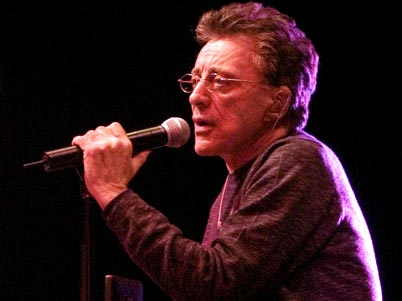 Neither
of your parents sang – at least professionally. How did you know you
wanted to be a singer?
Neither
of your parents sang – at least professionally. How did you know you
wanted to be a singer?
I don’t know. As a kid, I always sang. I
listened to the radio and back in the day they used to sell a magazine
called Hit Parade and it had the lyrics to all the songs on it.
I would listen to a radio station that would play all the hit songs and
I’d have the lyrics and I’d sing along.
It was difficult for
most artists to balance a solo career and work together with a group for
long periods of time – however you were mostly able to do that with the
Four Seasons. Was that hard sort of having two careers? How did you
decide what songs were good for the group and good for yourself? For
example, you tended to use the falsetto less in your solo singles.
Well, in actuality, the stuff I was recording was a little different
than we would record as a group effort. I never really found that much
difficulty in balancing it. They were two entirely different things.
It’s like: how can you talk and walk at the same time? It’s a matter of
how can you sing and be an actor? Or have hobbies and do other things
in you life? I like singing, so it really didn’t matter whether I was
singing with a group or singing solo.
You have a very
distinctive singing style with the falsetto. I know that when you
started out, it was a big style with doo wop, but your work has long
outlived that. Why do you think it works best for you? Is it just the
most natural way for you to sing?
Well, I think actually I’m really stronger in the baritone with the vibe
range. It’s not that there’s a preference or anything. It’s a stroke
of art, falsetto. Or a different flavor. It was terrific to be able to
have it and use it, but under normal circumstances, even when I was
growing up and I was singing, there was a combination and variation of
different kinds of music I was listening to. I listened to a lot of
jazz and a lot of R&B. There was a combination. In R&B they were using
falsetto, but in most cases they used it as background. We decided to
use it in a much stronger way as the lead and became very successful
with it.
Your music is now
being exposed to a whole new generation of fans now through the musical
Jersey
Boys. Were you surprised when the idea of a musical came up and by
how popular it became? How involved were you with the play?
The musical was an idea that we had for a very long time. We thought
there was a story here about the four of us – especially since we all
came from rather poor backgrounds. [It’s] a human interest side of guys
who grew up in poor neighborhoods, some who had trouble with the law –
and went on to become successful. Fortunately for us, we had a great
success with it. There’s a human interest side of it and a part of our
lives that the public had not really known about.
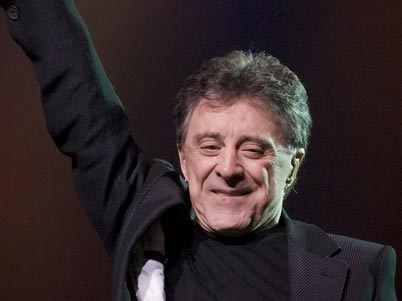 You
recorded the song “On Broadway” with the Jersey Boys on your new CD.
Was it fun to work with them?
You
recorded the song “On Broadway” with the Jersey Boys on your new CD.
Was it fun to work with them?
Yes it was. It was a lot of fun. Something a little different. The
idea that the song be called “On Broadway” and they were appearing on
Broadway. I think that even as a kid – going to New York City, walking
Broadway and the theater district, seeing the marquees of different
stars appearing on Broadway was very inspirational.
Romancing the 60s is your first solo album in 28
years. What gave you the itch to record again?
Well, we had a call from a record company who asked if we’d be
interested in doing an album. We thought about what kind of an album we
would do and the 60s seemed to be a great idea because there were many,
many songs in the 60s that have withstood the test of time. It was a
good feel for me because I some of them were my favorite songs.
There are so many
great romantic songs from the sixties – many that you had recorded – was
it hard to pick just fourteen of those for
Romancing the 60s?
It really was. We must have listened to hundreds of songs.
Do you think you
might be doing more of these albums in the future to cover some songs
you couldn’t include?
I’m not too sure. The record business is in a very strange place. I
still would like to do more recordings, but I’m not sure whether I want
to just go in and record rock and roll oldies. There are a lot of
standards. As I said, my main thrust in this business was jazz I grew
up listening to as a kid.
That would be another
good idea. These are romantic songs of the 60s. Do you think you may
do more in this series looking at some of the other sides of that or
other eras – i.e. soulful, protest, story songs or like you said more
jazz-oriented things?
Well, you get the portfolio of writers like Cole Porter and Irving
Berlin and the Gershwins and Rodgers & Hart – I mean the list goes on.
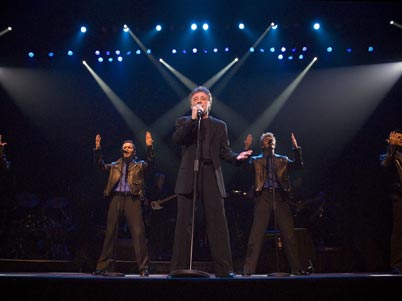 I
noticed that you picked two songs each from the Drifters and Burt
Bacharach to record. Were these artists particular favorites of yours?
I
noticed that you picked two songs each from the Drifters and Burt
Bacharach to record. Were these artists particular favorites of yours?
Yes they were. And the songs were also. It wasn’t just artists. It
was songs, so the writers played a very, very important part in that.
Burt Bacharach and Hal David are two incredible writers. Carole King.
Leiber and Stoller in that period of time that they were writing songs.
There was just a slew of really great, talented people that came from
that period.
Well, speaking of
great songwriters from that time, the new CD – as much of your work –
was produced by Bob Gaudio. The two of you have been working together
for since the early 60s. Why do you think the two of you get along so
well working together and how does he bring out the best in you?
I think because we have a mutual respect for each other and for each
other’s ability and talent. Bob Gaudio is in that category of some of
the best writing that I’ve seen. That’s what brought us together right
from the beginning.
Last year Rhino
released a box set of your music with and without the Four Seasons. How
gratifying was it to see your whole career laid out like that and get
some exposure for some songs people won’t necessarily find on the hits
albums?
It’s always gratifying. One of the hardest things for me is the fact
that we have in the course of years from ’62 – with all the albums that
we’ve recorded, there’s so much material that the public is not aware
of. I would like to one day take some of the obscure [songs] and put an
album or two like that together. Because some of the songs that never
had a chance, I think, are as good as some of those that made it very
big.
That box set also had
a DVD, which showed that the Four Seasons were into filming music videos
– for stuff like “Who Loves You” and “December 1963” – long before MTV.
Have you always been interested in the visual aspect of music?
Yes we were. The problem we had in most cases was that we were never
locked into a major record company who had the money to spend to do
those kinds of things. So there wasn’t as much of that… and maybe that
was good. Maybe that’s one of the reasons that the play was so
successful, because there wasn’t that much that anybody knew about us
except the music.
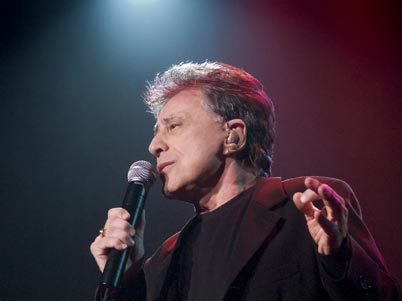 Speaking
of “December 1963 (Oh What a Night),” several years ago that song
returned to the top of the charts in a remixed version. How much of a
surprise was that? What did you think of the changes the mixers made in
the songs to make it more dance-oriented and “modern?”
Speaking
of “December 1963 (Oh What a Night),” several years ago that song
returned to the top of the charts in a remixed version. How much of a
surprise was that? What did you think of the changes the mixers made in
the songs to make it more dance-oriented and “modern?”
You know, I’m a firm believer that a good song is a good song, no matter
when it’s done. I mean, the Lauryn Hill version of “Can’t Take My Eyes
Off of You” is another great example. Songs can be done lots of
different ways and by different people. The secret is to take a song
and make it yours.
It’s interesting with
your album of all covers that many of your songs have been recorded by
others – obviously beyond the Jersey Boys, for example like you said,
“Can’t Take My Eyes Off of You” became a hit for Lauryn Hill, “Working
My Way Back to You” for the Spinners and “Let’s Hang On!” for Barry
Manilow. Is it interesting to you to see how other artists interpret
songs that you are best known for recording?
It’s more interesting to see how big the hits become, because we’re
involved in the publishing, so it’s very fruitful for us. It’s nice to
see that people think that some of your work was that important and some
of the songs you recorded were that important that they would like to
cover them.
We mentioned Broadway
a little earlier with
Jersey Boys, but
you are sort of represented on Broadway with another show as well. When
you were asked to record the theme for the movie Grease did you
have any idea that it would still be a cultural milestone three decades
later? What was it like to work with the BeeGees on the song at the
height of their popularity?
Well, the BeeGees were one of my all-time favorite groups. Barry Gibb
wrote “Grease.” The first day I heard it, I felt it was a hit song. It
feels terrific to have been able to be attached to a major motion
picture like Grease and have the title song become a number one
record.
You have done some
acting over the years – most significantly on
The Sopranos. What was that like? Would you like to do
more?
Well, it was a lot of fun and certainly I’d like to do more as an
actor. Unfortunately because of my performing schedule, it’s been
rather difficult for me to really zero in on becoming an actor. But,
occasionally, if an acting role comes about, I certainly would be
thrilled to read for it.
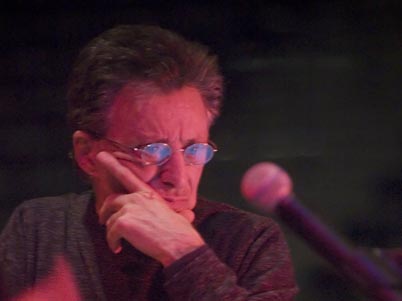 Was
The
Sopranos role written specifically for you, or how did you get it?
Was
The
Sopranos role written specifically for you, or how did you get it?
Originally I auditioned for The Sopranos and didn’t get a role
until four years later. Then I got to do seven episodes. I don’t know
what the thinking behind it was. I know when I auditioned for [Sopranos
creator] David Chase – who did a brilliant job with The Sopranos
– he said the part I auditioned for; he didn’t feel was right for me.
But he said “I really like your character and I’m going to find
something for you. Or write something for you.” I thought he might
possibly just be stroking me. Four years later, I got a call.
You’ve sort of,
inadvertently apparently, become involved in the current Presidential
race. Your single “Can’t Take My Eyes Off of You” was used on a McCain
video against Obama – which was quickly pulled. Had they used the song
without getting permission?
You know, I still haven’t made up my mind, until I see some Presidential
debates. But, they did that without permission and that’s why it was
taken off. Usually I really don’t get involved in politics. What I do
for a living is entertain people. I’m not an expert on politics,
although I may have a point of view. I do try to sort it out and try to
figure out who the best is. It doesn’t matter to me whether they are
Republican, Democrat or whatever they are. You try to find the people
that you think would do a good job.
Radio has become so
regimented over the years. When you were coming up, radio stations
would play all types of music – rock, soul, country, jazz, doo wop – and
that just doesn’t happen anymore. Do you think that can hinder newer
artists from finding an audience?
I think it hinders radio. To have a broad scope of music and play
something for everybody would be the way – if I had a radio station,
that’s the way I would run it. Frankly, radio is falling apart, because
it’s not doing that. Why would you want to listen to a station that
played one particular kind of music all day long? And let’s not lose
sight of the fact that it was called Top 40 radio and it played 40
records. Now they play the same ten songs or twelve songs over and over
and over again.
You’ve had such a
long and popular career – looking back how would you like people to see
your work?
Probably as a guy who loved what he did and cared enough about his art
to really want to do a good job and never take [fans] for granted.
Are there any
misconceptions you’d like to clear up?
Well, I find that the music business and the acting business and the
theater business are all basically the same. There’s politics in every
form of life, I guess. Being in the right place at the right time and
having the right people like you or hanging out with the right people
has an awful lot to do with successes. It’s not always an individual’s
talent. There are probably more talented people – who have never really
had an opportunity – than those who have made it.